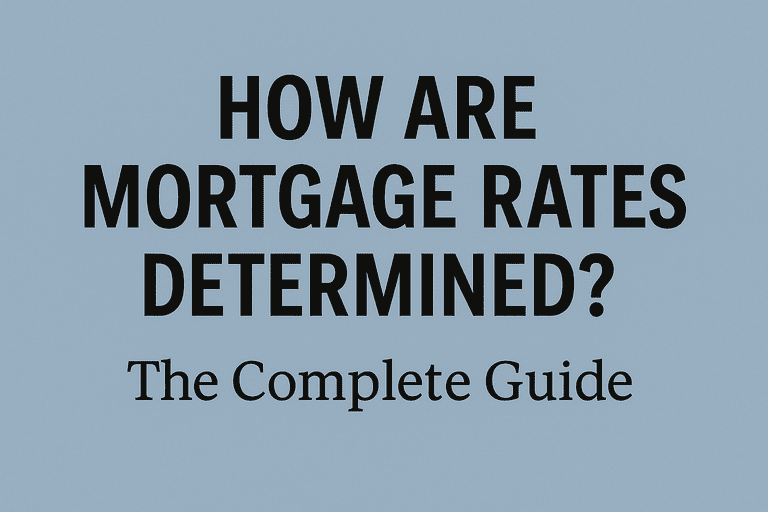Understanding how mortgage rates are determined is essential for anyone considering a home loan. Mortgage rates affect your monthly payments and the total cost of your home, so knowing what influences these rates can help you make informed decisions. In this comprehensive guide, we’ll explain how mortgage rates are determined, the factors that influence them, and what you can do to secure the best rate possible.
What Determines Mortgage Rates? An Overview
Mortgage rates are determined by a combination of broad market forces and individual borrower factors. While the overall economy sets the stage, your unique financial profile plays a pivotal role in the rate you receive. Let’s break down these influences.
Market Factors That Determine Mortgage Rates
1. The Federal Reserve and Interest Rates
The Federal Reserve (Fed) sets the federal funds rate, which is the rate at which banks lend to each other overnight. When the Fed raises this rate, borrowing costs for banks increase, and lenders often pass these costs on to consumers through higher mortgage rates. Conversely, when the Fed lowers rates, mortgage rates may decrease, although not always in direct proportion.
2. Bond Market and Treasury Yields
Mortgage rates closely follow the yields on 10-year U.S. Treasury notes. When Treasury yields rise, mortgage rates typically rise as well, and when they fall, mortgage rates tend to decrease. This is because mortgage-backed securities (MBS), which fund most home loans, compete with Treasuries for investors’ money.
3. Mortgage-Backed Securities (MBS) and the Spread
Most mortgages are bundled into MBS and sold to investors. The difference between the yield on these securities and the 10-year Treasury is known as the “spread.” This spread accounts for the additional risks and costs associated with mortgages, such as default risk and servicing costs. The spread can widen or narrow depending on market conditions, impacting mortgage rates.
4. Economic Indicators and Inflation
Inflation is a major driver of mortgage rates. When inflation rises, lenders demand higher rates to compensate for the decreased purchasing power of future interest payments. Economic growth, employment data, and geopolitical events can also influence mortgage rates by affecting investor sentiment and demand for bonds.
Personal Factors That Determine Your Mortgage Rate
1. Credit Score
Your credit score is one of the most important personal factors that determine your mortgage rate. Borrowers with higher credit scores are considered less risky and typically receive lower rates. Conversely, lower credit scores can lead to higher rates or even loan denial.
2. Down Payment and Loan-to-Value Ratio (LTV)
A larger down payment reduces the loan-to-value ratio, making you less risky to lenders. The lower your LTV, the better your mortgage rate is likely to be. If your down payment is less than 20%, you may also be required to pay for mortgage insurance, which increases your overall borrowing cost.
3. Loan Type and Term
Different types of loans (conventional, FHA, VA, jumbo) and loan terms (15-year vs. 30-year) come with different risks and costs for lenders. Generally, shorter-term loans and government-backed loans offer lower rates, while jumbo and non-conforming loans may have higher rates.
4. Property Type and Occupancy
Lenders consider the type of property (single-family, condo, multi-unit) and whether it will be your primary residence, second home, or investment property. Primary residences usually qualify for the lowest rates, while investment properties carry higher rates due to increased risk.
5. Discount Points and Fees
Borrowers can pay “discount points” upfront to lower their interest rate. Each point typically costs 1% of the loan amount and reduces the rate by a set amount. Origination fees and other closing costs also affect the overall cost of your mortgage.
How Lenders Set Mortgage Rates: The Process
Lenders use a combination of the above market and personal factors to set your mortgage rate. They start with a base rate influenced by the bond market and the Fed, then adjust it based on your creditworthiness, down payment, loan type, and other individual factors. The result is a personalized rate that reflects both current market conditions and your financial profile.
Why Do Mortgage Rates Change?
Mortgage rates are always in flux because they respond to changing economic conditions, investor demand, and shifts in the bond market. For example, if investors flock to bonds during uncertain times, yields drop and mortgage rates may fall. When the economy is strong and inflation is rising, rates tend to increase.
Frequently Asked Questions: How Are Mortgage Rates Determined?
Can I Negotiate My Mortgage Rate?
Yes, mortgage rates are negotiable to some extent. Lenders have a bottom line, but shopping around and improving your financial profile can help you secure a better rate.
Do All Lenders Offer the Same Mortgage Rates?
No, rates can vary between lenders due to differences in operating costs, risk tolerance, and business strategies. It’s wise to compare offers from multiple lenders.
How Can I Get the Best Mortgage Rate?
To get the best mortgage rate, maintain a high credit score, save for a larger down payment, choose the right loan type, and shop around for lenders. Paying discount points can also help lower your rate.
Key Takeaways: How Are Mortgage Rates Determined?
Mortgage rates are determined by a blend of market forces (Fed policy, bond market, inflation) and personal factors (credit score, down payment, loan type).
The 10-year Treasury yield and the spread between Treasuries and mortgage-backed securities are crucial benchmarks for mortgage rates.
Your unique financial situation—credit score, LTV, loan type, and property use—directly impacts the rate you receive.
Rates change frequently due to shifts in the economy, investor sentiment, and lender competition.
Conclusion
Understanding how mortgage rates are determined empowers you to make smarter decisions when applying for a home loan. By staying informed about market trends and improving your personal financial profile, you can position yourself to secure the best possible rate. Remember, even small differences in mortgage rates can add up to significant savings over the life of your loan.
